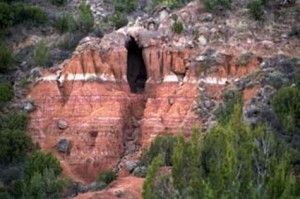
Palo Duro Canyon State Park © Carl & Peggy Backes.
I remember the first time I ever saw Arizona’s Grand Canyon for myself. It was a sunny May afternoon several years ago, and the emerald-hued Colorado River glistened as it snaked between the multi-layered, reddish-brown cliffs that define the Grand Canyon – an ancient formation that many consider to be one of the Seven Natural Wonders of the World. Witnessing that incredible place was truly one of the more breathtaking moments of my life – an experience that I wish everyone could have.Whether you encounter it hiking along the northern or southern rims, taking a mule trip down into the canyon, or rafting down the river itself, you simply must visit Grand Canyon National Park (928/638-7888, South Rim open 24 hours daily year-round, North Rim open mid-May-mid-Oct., $25 vehicles, $12 individuals, other fees vary depending on activity) in northern Arizona at least once in your lifetime. Before planning a trip to this one-of-a-kind destination, consult the information and accompanying map available on Moon.com.
Of course, even if you’ve never been to the Grand Canyon, chances are you’ve heard of it. But how much do you know about the second-largest canyon in America?
Nearly 30 miles southeast of Amarillo lies Palo Duro Canyon State Park (11450 Park Rd. 5, Canyon, 806/488-2227, 8 a.m.-8 p.m. Sun.-Thurs. and 8 a.m.-10 p.m. Fri.-Sat. May and mid-Aug.-Sept., 8 a.m.-10 p.m. daily June-mid-Aug., 8 a.m.-6 p.m. Sun.-Thurs. and 8 a.m.-8 p.m. Fri.-Sat. Oct.-Apr., $5 adults, children under 12 free), a 29,182-acre preserve that encompasses part of the 120-mile-long, 800-foot-deep canyon affectionately termed “the Grand Canyon of Texas.” Although the park, which was established in 1934, offers a small interpretive center, containing geology, history, and wildlife exhibits, the real sights are naturally the outdoor ones, from the multicolored cliffs, created by water and wind erosion, to the ubiquitous mesquite and juniper trees, which inspired early Spanish explorers to name the canyon Palo Duro (meaning “hard wood” in Spanish).
This scenic region, formerly home to nomadic hunters, various Native American tribes, and cattlemen, now welcomes family vacationers and outdoor enthusiasts alike. Popular activities include picnicking, hiking, mountain biking, and horseback riding. Old West Stables (806/488-2180, $35-140) even offers horse rentals and guided rides through the park – reservations are usually required, depending on the specific tour, and weight restrictions apply for all rides. If you visit during the summer months, another curious diversion is the outdoor musical drama TEXAS (1514 5th Ave., Canyon, 806/655-2181, 8:30 p.m. Tues.-Sun. June-mid-Aug., $14-30 adults, $10-26 children) in the Pioneer Amphitheatre, preceded by a scrumptious dinner (6 p.m., $16 adults, $12 children) courtesy of Amarillo’s famous Big Texan Steak Ranch, which I featured in a previous post, “An Amarillo Detour.”
To truly enjoy your visit, consider staying overnight in the park. For no-frills camping, you’ll find backpacking sites ($12 for four people), equestrian sites ($12 per site), and developed primitive areas ($12 per site). Various rules apply for each type of camping; for instance, backpackers may bring leashed pets but cannot have campfires. RV campers are welcome, too; three different camp loops ($22-25 per site) provide electrical hookups (30- or 50-amp service), tables, fire rings, and restrooms. Each site allows a maximum of eight people and three vehicles. Of course, if you really want to camp in style, reserve one of seven available cabins (512/389-8900, $60-125 d), which range in size and amenities.
For information about other Texas attractions, consult Moon Texas, a comprehensive travel guide written by Andy Rhodes. If you’re particularly curious about outdoor destinations in the Lone Star State, be sure to explore his recommended list of natural wonders, where he briefly mentions Palo Duro.